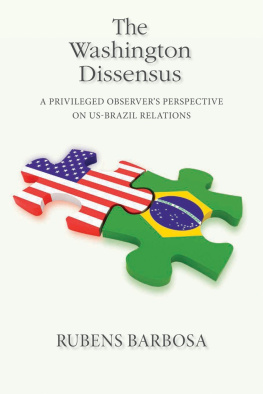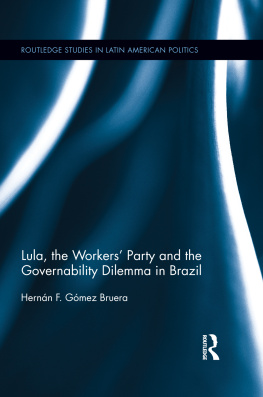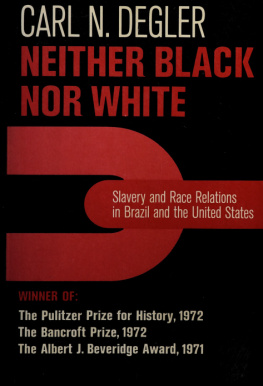Translation copyright 2014 by Vanderbilt University Press
Nashville, Tennessee 37235
All rights reserved
First printing 2014
Originally published in Brazil as O Dissenso de Washington by Agir, Rio de Janeiro, in 2011. Copyright 2011 by Editora Nova Fronteira Participaas S.A.
Translated by Anthony Doyle
This book is printed on acid-free paper.
Manufactured in the United States of America
Library of Congress Cataloging-in-Publication Data on file
LC control number 2014008055
LC classification number E183.8.B7B378513 2014
Dewey class number 327.73081dc23
ISBN 978-0-8265-2011-1 (hardcover)
ISBN 978-0-8265-2012-8 (paperback)
ISBN 978-0-8265-2013-5 (ebook)
Preface: Brazil in the World
TWENTY YEARS AGO BRAZIL WAS STRUGGLING to survive severe international crises and internal economic instability. The Mexican, Asian, Russian, and Argentinean crises; the mismanagement of the entrepreneurial state; and the disastrous effects of inflation on workers are still fresh in memory.
Thanks to the continuity of the economic policy that started with the Plano Real during the FHC government, the picture in Brazil today is hugely different. Economic stability and social programs have allowed for domestic market expansion, a significant reduction in poverty, and the emergence of a middle class of forty million people that today represents 54 percent of the Brazilian population. At the same time as democracy and institutions were strengthened, Brazil experienced high rates of growth as a result of policies that kept inflation low and stable, the fiscal situation under control, and the floating exchange rate in place.
Brazils growing international presence beyond the South American continent can be gauged by the internationalization of Brazilian industry, and from the manner in which it asserts its interests in international forums.
Despite their different styles and backgrounds, Fernando Henrique Cardoso and Luis Incio Lula da Silva, both of whom I had the honor of representing in Washington, made valuable contributions to enhancing Brazils global visibility through their interactions with other heads of state and the contacts they made and maintained abroad. From the international point of view, the voice of Brazil could no longer be ignored on global issues of interest to the developed countries, such as international trade, climate change, energy (biofuel and oil), agriculture and food security, water, and human rights. The new concept of BRICs, an acronym for Brazil, Russia, India, and China, is an indication of the global significance of Brazil and countries like it.
The traditional involvement of Brazilian diplomacy in multinational institutions strengthened the image of the country as a consensus builder and an honest broker. Brazils ethnic and religious harmony and the role of moderator it exercises in the troubled context of South America also drew the worlds attention.
The greater activism of the Lula government and its focus on foreign policy in South America, Africa, and the Middle East, a reflection of the priority it placed on relations with the geopolitical South (South to South relationship), resulted in Brazils increasing capacity to perform both regionally and globally.
Unlike the other BRIC countries, Brazil is not a nuclear power. This fact, associated with its independent positions in defense of its interests, opened space for the Brazilian government to make incursions into disputes previously the preserve of the developed countries, such as the Iran-US dispute over the Iranian nuclear program.
Brazil has also been engaged in the global governance discussion on the reform of multilateral institutions. In the context of the G20, the consulting mechanism that has been gradually replacing the G8, Brazil has been a strong voice in favor of a more active participation by emerging countries in the World Bank and the IMF. Brazil has also long defended a comprehensive reform of the political and economic mechanisms of the UN and supports UN Security Council expansion to include a greater number of permanent and nonpermanent members in order to increase the weight and representativeness of this overseer of world peace and international security.
Brazils growing foreign presence as a soft power can only be sustained if economic stability and growth and domestic market expansion are consolidated and if its foreign policy remains proactive and consistent.
There is domestic consensus for the growing role of Brazil as a global player and global trader. The time is ripe to focus on those issues that might secure a place for Brazil among the most relevant players on the political and economic world scene.
So Paulo, July 1, 2014
DURING MY NEARLY FIVE YEARS as ambassador in Washington, between 1999 and 2004, I kept a systematic record of all the main events with which I was involved, directly or indirectly, or on which I exercised some influence.
The account presented herein follows the chronology of these records. It is not intended to be either exhaustive or especially meticulous, but merely an objective description of a particularly eventful period of diplomatic life in Washington. The idea is not to make an academic treatment of Brazil-United States relations, but when it is pertinent to do so, synthetic analyses or assessments will be made. Nor is it the purpose here to analyze broader aspects of Brazilian foreign policy not directly related to BrazilUS relations.
From the privileged vantage point of an embassy in DC, this book draws a panorama of the diplomatic relations between Brazil and the United States and the main regional and global issues that came to bear during my service to Brazil and Itamaraty, as the Brazilian Foreign Ministry is also known. In addition, I have seen fit to include a brief look at relations between the period April 2004, when I left the embassy, and May 2011, when this book was completed, as well as a closing chapter that puts the events discussed into wider historical perspective.
An ambassadorship, even in posts of the utmost political and diplomatic importance, does not always coincide with milestone events in the histories of the host or home country. In my case, however, I witnessed facts of particular relevance, such as presidential elections that brought opposition candidates into office in both the United States and Brazil; the September 11 terrorist attacks; and the ensuing wars in Afghanistan and Iraq.
I also had the exceptional experience of accompanying, at close quarters, a lengthy period of relations between Brazilian and US administrations representing two presidents (Cardoso and Lula) who were pursuing very different lines of foreign policy, occasionally leading to breakdowns in mutual understanding between the two countries.
Despite our good relations with the United States on political and diplomatic issues, dialogue with the American government was almost exclusively limited to issues of a bilateral nature, as well as certain regional and a handful of global problems and occasional matters of specific interest to Washington. At that time, Brazil had some involvement in the broader issues of international politics of the day, but its role in these was of less significance.










